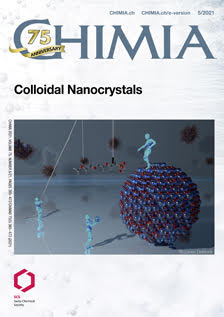Colloidal Nanocrystals: A Toolbox for Materials Chemistry
DOI:
https://doi.org/10.2533/chimia.2021.387PMID:
34016233Keywords:
Colloidal nanocrystals, Functional materials, Materials chemistryAbstract
Colloidal nanocrystals are the ideal building blocks for the fabrication of functional materials. Using various assembly, patterning or processing techniques, the nanocrystals can be arranged with unprecedented flexibility in 1-, 2- or 3-dimensional architectures over several orders of length scales, providing access to ordered or disordered, porous or non-porous, and simple as well as hierarchical structures. Careful selection of colloidal nanocrystals allows the properties of the final materials to be predefined. Moreover, by combining different nanocrystals, these properties can be fine-tuned for a specific application, opening up fascinating opportunities to create new materials for energy storage and conversion, catalysis, photocatalysis, biomedicine or optics. Indeed, functional materials made of preformed nanoparticles have been realized for metals, polymers, semiconductors, and ceramics, as well as for composites and organic-inorganic hybrids. In this review article, we introduce some concepts for the fabrication of colloidal nanocrystals and their assembly into dense and porous 3-dimensional structures. Porosity is a particularly important material property that strongly influences its application potential. Therefore, we pay special attention to this aspect and compare porous materials synthesized from nanoparticles with those from molecular routes. An additional focus is set on the degree of structural order that can be achieved on different length scales.Downloads
Published
2021-05-28
Issue
Section
Scientific Articles
License
Copyright (c) 2021 Fabian Matter, Markus Niederberger, Florian Putz

This work is licensed under a Creative Commons Attribution 4.0 International License.
How to Cite
[1]
Chimia 2021, 75, 387, DOI: 10.2533/chimia.2021.387.







